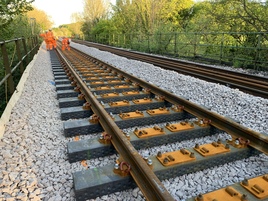Network Rail has installed the first plastic sleepers on its main lines, ahead of a ban on creosote use coming into effect.
Made from recycled material by Sicut Ltd in the UK, the new sleepers have been used on Sherrington Viaduct between Salisbury and Warminster.
With concrete sleepers being considered too heavy for the Wiltshire structure, wooden sleepers would previously have been chosen. However, with creosote treatment of softwood sleepers being banned from July 31, the alternative would have been to use hardwood, sourced mainly from Brazil.
NR says the recycled composite sleepers will help it achieve its ‘Zero Carbon 2050’ target through at least a 40% reduction in greenhouse gas emissions from sleeper production and the embodiment of recycled plastic within the track infrastructure for at least 50 years.
Plastic sleepers also offer an increase in service life and reduced maintenance compared with wood.
“Not only are these sleepers made from locally-sourced plastic waste, they need less maintenance and will last longer, underlining our commitment to create a greener, cleaner and more efficient rail network,” said Rail Minister Chris Heaton-Harris.















Login to comment
Comments
AS - 08/07/2021 00:44
Nice, have they considered the major impact that the microplastics these will release as they wear will cause?
Gil - 08/07/2021 22:33
What about high heat causing them to melt in extreme global warming temperatures
dw - 09/07/2021 10:15
While I respect the comments already made it will only be by doing this and observing it that the problems will be exposed, understood, and solved.
Mick Oliver - 11/07/2021 17:30
other preservative treatments could be used on sustainably sourced timbers. copper- chrome-arsenic is suitable for this application - with a long history of use. Or is this also unacceptable?